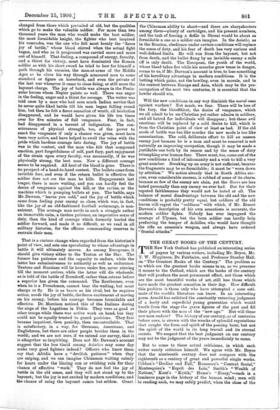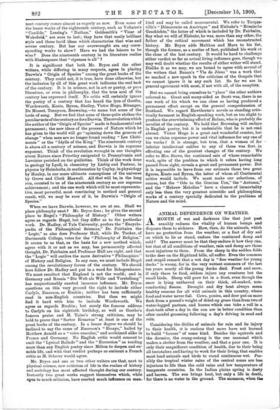THE GREAT BOOKS OF THE CENTURY. T HE New York Outlook
has published an interesting series of papers by various writers, including Mr. Bryce, Mr. T. W. Higginson, Dr. Fairbairn, and Professor Stanley Hall, on " The Greatest Books of the Century." The problem as to which are the greatest books means to us, as we presume it means to the Outlook, which are the books of the century that will produce the most permanent effect, not those which are the most beautiful works of art, still less those which have made the greatest sensation in their day. How difficult this problem is those only who have attempted a sane esti- mate of the world's literature can know. In an interesting poem Arnold has satirised the constantly recurring judgment of a hasty and superficial young generation which would hustle from the stage the grave figures of the past and fill their places with the men of the "new age." But will these new men endure? The history of our century, as of centuries before ours, is strewn with the wrecks of splendid reputations that caught the form and spirit of the passing hour, but not the spirit of the world in its long travail and its eternal secrets. We suspect that the best judgment on our century may not be the judgment of the years immediately to come.
But to come to these actual criticisms, in which each writer surely criticises himself. We agree with Mr. Bryce that the nineteenth century does not compare with the eighteenth as a century of great and powerful single works. Gibbon's "Decline and Fall," Rousseau's " Contrat Social," Montesquieu's " Esprit des Lois," Smith's " Wealth of Nations," Kant's " Kritik," Hume's " Essay,"—each is a luminous page in the history of the human mind ; men will be reading each, we may safely predict, when the close of the
next century comes almost as eagerly as now. Even some of the lesser works of the eighteenth century, such as Voltaire's Candide," Lessing's " Nathan," Goldsmith's " Vicar of Wakefield," are sure to last; they have that easily brilliant style and those lucid ideas which characterise that wise and serene century. But has our overwrought era any corre- sponding works to show? Have we had the leisure to be wise ? Does the nineteenth century in its literature realise with Shakespeare that " ripeness is all" P It is significant that both Mr. Bryce and the other writers, while differing in many respects, agree in placing Darwin's " Origin of Species " among the great books of the century. They could not, it is true, have done otherwise, but the inclusion by all of this great work indicates the real task of the century. It is in science, not in art or poetry, or pure literature, or even in philosophy, that the true soul of the
century has expressed itself. No critic will certainly ignore the poetry of a century that has heard the lyre of Goethe, Wordsworth, Keats, Byron, Shelley, Victor Hugo, Beranger, De Musset, Tennyson, Browning,—to name but some of the lords of song. But we feel that none of these quite strikes the peculiar note of the century as does Darwin. The revolution which the author of the "Origin of Species" made is fundamental and permanent; the new ideas of the process of Nature which he has given to the world will go " spinning down the grooves of change " when men are no longer found reading " Les Chati- meats " or the "Idylls of the King." The nineteenth century is above all a century of science, and Darwin is its supreme exponent. Think of the revolution wrought in our thoughts about Nature since Priestley emigrated to Pennsylvania and Lavoisier perished on the guillotine. Think of the work done in geology by Lyell, in chemistry by Liebig and Pasteur, in physics by Helmholtz, in mathematics by Cayley, in physiology by Huxley, in our more ultimate conceptions of the universe by Grove and Clerk Maxwell. All that will be, in the long run, counted to us of the nineteenth century as our supreme achievement ; and the one work which will be most representa- tive, most powerful, most convincing in method and general result, will, we may be sure of it, be Darwin's "Origin of Species."
When we leave Darwin, however, we are at sea. Shall we place philosophy next ? Mr. Bryce does ; be gives the second place to Hegel's "Philosophy of History." Other writers agree as regards Hegel, but they differ as to the particular work. Dr. Hadley, of Yale University, prefers the " Encyclo- paedia of the Philosophical Sciences," Dr. Fairbairn the " Logic," as also does Professor Hall, while Dr. Tucker, of Dartmouth College, votes for the "Philosophy of Religion." It seems to us that, as the basis for a new method which, agree with it or not as we may, has permanently affected thought, Dr. Fairbairn and Professor Hall are right, and that the " Logic " will outlive the more derivative " Philosophies " of History and Religion. In any case, we must include Hegel among the revolutionary forces of the century. We should here follow Dr. Hadley and put in a word for Schopenhauer. We must recollect that England is not the world; and in Germany and Russia "Die Welt als Wille and Vorstellung" has unquestionably exerted immense influence. Mr. Bryce questions on this very ground the right to include either Carlyle, Emerson, or Ruskin ; neither has been sufficiently read in non-English countries. But then we might find it hard with him to include Wordsworth. We agree as regards Ruskin ; but surely the famous address to Carlyle on his eightieth birthday, as well as Goethe's famous praise and M. Taine's strong criticism, may be held to prove that " Sartor Resartus " at . least is one of the great books of the century. In a lesser degree we should be inclined to say the same of Emerson's " Essays," hailed by Matthew Arnold as a " voice oracular," and acclaimed alike in France and Germany. No English critic would consent to omit the "Lyrical Ballads" and the " Excursion " as tending more than any English poetry since Milton to deepen and en- noble life, and with that verdict perhaps so eminent a French critic as M. Scherer would agree.
Mr. Bryce and one or two other writers see that, next to physical science, new criticism of life in the realms of history and sociology has most affected thought during our century. Instantly two great works suggest themselves which, while open to much criticism, have exerted much influence on man. kind and may be called monumental. We refer to Tocque- rifle's " Democratie en Amerique " and Niebuhr's " ROmische Geschichte," the latter of which is included by Dr. Fairbairn. Say what we will of Niebuhr, he was, more than any other, the father of the critical movement which has reconstructed history. Mr. Bryce adds Malthus and Marx to his list, though the former, as a matter of fact, published his work at the close of the last century. It would be hard to challenge either verdict so far as actual living influence goes, though we may well doubt whether the results of either writer will stand. Dislike it as we may, we are bound to agree with several of the writers that Renan's "Vie de Jesus" was a work that so marked a new epoch in the criticism of the Gospels that we cannot ignore it in any such list. So far we are in general agreement with most, if not with all, of the essayists.
But we cannot bring ourselves to " place " the other authors referred to. Great and many-sided as Scott was, there is no one work of his which we can class as having produced a permanent effect except on the general comprehension of Scotland. We regard Hawthorne's novels as standing artis- tically foremost in English-speaking work, but as too slight to produce the overwhelming effect of Balzac, who is probably the novelist of the century. We hold that Browning will endure in English poetry, but it is undeniable that he is not read abroad. Victor Hugo is a great and wonderful creator, but can we claim supreme power and vital influence for any one of his works ? It is strange, but true, that a woman of far inferior intellectual calibre to any of these was first in effecting one of the greatest changes of the century. We refer to Mrs. Stowe, the continued sale of whose remarkable work, spite of the problem to which it refers having long passed from sight, reveals a great and permanent power. But it is impossible to leave from our estimate those two great figures, Keats and Byron, the latter of whom all Continental critics would include. We must make our selections, of course, but the " Ode to the Grecian Urn," the " Autumn," and the " Hebrew Melodies " have a chance of immortality only less than the very greatest scientific and philosophical works of a century specially dedicated to the problems of Nature and the mind.















































 Previous page
Previous page